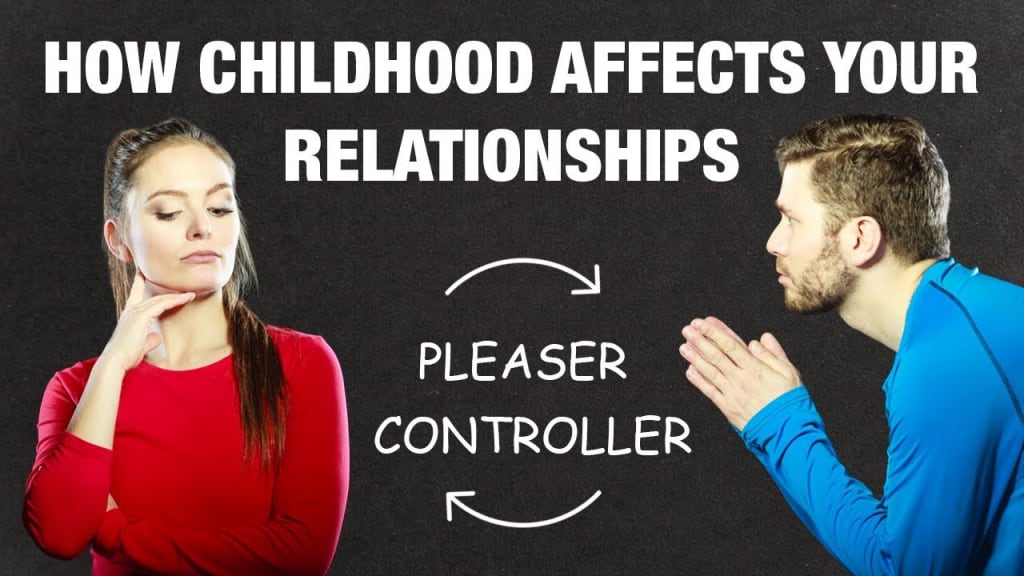How Your Childhood Affects Your Love Style
If you take a closer look at your current relationship or any of your past relationships, you will probably realize that you tend to display many of the same behaviors. Perhaps you constantly try to control your significant other; or maybe you try to please them any way you can; or you notice that you have specific standards for who your partner should be. But there’s a reason for this! From the moment we begin to understand the world around us, we pay close attention to how our parents or caregivers behave toward us, and to each other - and we start to imitate those behaviors. Basically, the people around us in our childhood, shape how we relate to others in our adulthood. Based on how we give and express love, most of us will fall into one of five distinct love style categories. Learning what category you fit into, can help you cultivate stronger relationships. So, let’s find out what they are.

How Your Childhood Affects Your Love Style
If you take a closer look at your current relationship or any of your past relationships, you will probably realize that you tend to display many of the same behaviors. Perhaps you constantly try to control your significant other; or maybe you try to please them any way you can; or you notice that you have specific standards for who your partner should be. But there’s a reason for this!
From the moment we begin to understand the world around us, we pay close attention to how our parents or caregivers behave toward us, and to each other - and we start to imitate those behaviors. Basically, the people around us in our childhood, shape how we relate to others in our adulthood. Based on how we give and express love, most of us will fall into one of five distinct love style categories. Learning what category you fit into, can help you cultivate stronger relationships. So, let’s find out what they are.
Number One - The Pleaser Typically, people within this category were raised by parents who were either angry and critical, or overly protective. Pleasers may have also grown up in families with distressed parents or wild siblings. The pleaser is typically the “good kid.” They do everything they can to behave well - in order to avoid provoking their parents. In fact, children who turn out to be pleasers, are usually the ones giving comfort to their reactive parents - instead of receiving comfort from them. Growing up, pleasers appear to be well put together. They are usually very nice, and have a giving nature. They are also very committed - which is what their spouses get attracted to in the first place.
Although they may portray themselves as having everything figured out, pleasers are very uncomfortable with conflict. If they become involved in a disagreement, they try to end it as quickly as possible - by either making up for the conflict, or giving in. If a pleaser is bothered by something, they will usually be passive aggressive - instead of directly voicing their concerns. They’ve learned how to act in certain ways to ensure that they aren’t causing problems or making others upset. The pleaser has no personal boundaries and doesn’t like to say no. They will put others’ needs ahead of their own.
Even if it results in going against their morals, they will do whatever they can to please others. Pleasers also care very much about the opinions of people close to them, and they may come across as though they don’t have any opinions of their own. If you are a pleaser looking to build a stable relationship, it’s important to learn how to be honest with yourself and others - especially when it comes to your needs, wants, and feelings. It’s important to learn how to establish boundaries, stand up for yourself, and do what you know is right for you - instead of doing what others tell you to do.
Number Two - The Victim People who fit into this category, usually grow up in homes with lots of chaos and violence - with one or both parents being easily infuriated and violent. From a young age, victims learn that the best way to get ahead in life is by avoiding attention and keeping under the radar. They stay quiet when the violent parent is around, since that parent is easily triggered.
To avoid the hurt of their angry or violent parents, victims grow up building their own positive reality in their minds - and they use this as an escape route when real life becomes too much to handle. This may cause a lot of trauma, which results in low self-esteem and the avoidance of voicing their opinions. Typically, these individuals also struggle with depression or anxiety disorders. They may feel as if they don’t have the power to change things. And because they learned to be compliant, victims tend to just go with the flow; and they have a hard time resisting influence and maintaining personal boundaries.
Even when they seem calm, they may feel anxious and believe that something bad is about to happen. It’s easy for victims to fall into addiction as a coping mechanism, and they may also display anger toward children. Spouses of victims usually become attracted to them due to their compliance and non-resistance. However, as the relationship begins to develop, the spouse may start seeing them as childish - and begin to dislike them due to their weakness. Ironically, a lot of victims end up with partners who are controlling and infuriating - like the people they dealt with throughout their childhood. If you fall into this category, you should focus on standing up for yourself and not allowing others to manipulate and take advantage of you.
Number Three - The Controller The controller is usually raised in a home where they are given little to no attention. Without this needed form of human recognition, these children learn that surviving means taking care of themselves and avoiding dependence on anyone. As adults, they feel as if they need to control things at all times, because it keeps them from feeling helpless.
Once they lose control, they are left in a state of vulnerability. Controllers are easily provoked into anger because they learned to use it as a weapon to intimidate others. They often don’t have much empathy, and will usually demand compliance from people close to them - even when it can result in the other person getting hurt. People who fall into this ‘love style category’ are typically rigid and expect things to be done their way. And if things aren’t done their way, they get very angry.
Controllers also believe that the more unpredictable and sporadic they are, the harder it is for others to control them. They rarely step out of their comfort zone, and like to deal with problems alone - avoiding any situation that could leave them feeling vulnerable. They may also struggle with addiction. The spouses of controllers are initially attracted to them because of their ability to take charge of a situation. However, deeper into the relationship, the spouse may begin to feel afraid and abused. If you fall into this category, you should work on learning to trust others, how to let go of control and how to manage anger.
Number Four - The Vacillator Vacillators are typically raised by unpredictable parents - who give them just enough attention to make them want more, only to find that they never receive it. From a fairly young age, vacillators learn that they aren’t very high on their parent’s list of priorities. Due to this lack of attention, they become extremely sensitive to signs of connection and rejection, and develop a deep fear of being abandoned. Vacillators often feel alone and misunderstood.
They usually search for consistent love and affection, resulting in an idealization of relationships. When entering a new relationship, they may feel as if they have found their soul mate, and dedicate all of their time and attention to their partner. They believe that they will finally get the love and attention they crave so much. But sadly, their partners can’t live up to this idealized image, and it disappoints the vacillator to the point where they despise their partner, because they feel less loved than they should. Because of this, vacillators encounter lots of stress and conflict in relationships.
Due to their sensitivity to connection and rejection, even the slightest change in a significant other is easy for them to identify. Their spouses may be attracted to the constant passion in the beginning of the relationship, but they eventually begin feeling like they’re not enough. No matter what a vacillator’s spouse does, they never feel like it’s enough. That’s because the vacillator’s expectations are based on unrealistic and idealized visions. This forces their partner to be extra cautious, because they are afraid of the vacillator’s shifting moods. If you fall into this category, you should pace yourself and take the time to get to know someone before committing to a relationship. You need to learn how to have realistic expectations, so that you avoid any unnecessary disappointments.
Number Five - The Avoider Avoiders tend to grow up in homes that discourage affection, or show very minimal signs of it. Their childhood homes were based on performance - where independence and self-reliance were the only values being encouraged. This causes the avoider to feel as if hiding their true feelings is the only way to avoid seeming needy or annoying. They learn to care for themselves at a young age, and they teach themselves to handle situations based on logical reasoning - instead of through feelings.
At times, the avoider can feel uneasy dealing with the feelings of others around them, and they prefer to be indulged in their own thoughts. Even in adulthood, it’s not easy for them to verbally express love - so they express their feelings through non-verbal means: such as giving gifts, quality attention or physical touch. However, touch may sometimes be difficult - because some avoiders only prefer to touch during intimacy. They may avoid physical affection such as holding hands, cuddling, or hugging. The avoider typically has little empathy for others, and may prefer superficial conversations over deep ones - causing them to come off as dismissive.
Since they are focused on performance, many of them are workaholics who spend all of their time working - which makes their partners feel ignored. The avoider’s spouse may be initially attracted to them because of their responsibility and sense of stability. But later, they can feel unwanted and left out when it comes to making decisions. The spouse may also feel as if the avoider is emotionally detached. If you fall into this category, you must learn to open yourself up and express how you truly feel.
BECOME THE SECURE CONNECTOR These five love styles, reflect some of the different types of emotional injury people may experience in childhood, and how it can affect their relationships as adults. But regardless of your love style, you should work toward becoming a secure connector - someone who’s completely comfortable with both GIVING and RECEIVING love. Secure connectors are able to recognize their strengths and weaknesses, as well as the strengths and weaknesses of others.
They are able to interact with their partners without lessening their value, demeaning, or idealizing them in any way. They have no problem communicating their feelings and needs, and they are skilled at resolving conflict, as well as setting and maintaining personal boundaries. These characteristics are what ensure the healthiest and most stable relationships! What do you think?
What’s your love style? Let us know in the comments below! If you enjoyed this video, give it a thumbs up, and share it with your friends, so we can keep making them. For more videos like this, hit the SUBSCRIBE button, and remember to click on the notification bell.
About the Creator
Enjoyed the story? Support the Creator.
Subscribe for free to receive all their stories in your feed. You could also pledge your support or give them a one-off tip, letting them know you appreciate their work.






Comments
There are no comments for this story
Be the first to respond and start the conversation.